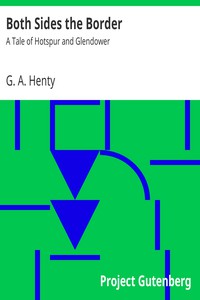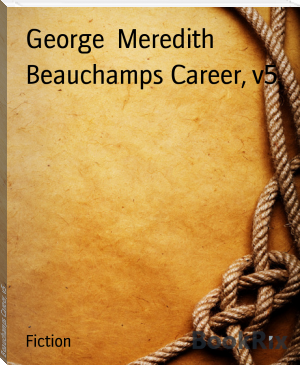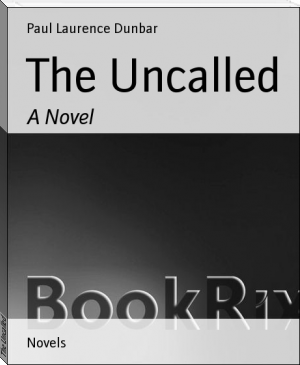Both Sides the Border: A Tale of Hotspur and Glendower by G. A. Henty (literature books to read .txt) 📗

- Author: G. A. Henty
Book online «Both Sides the Border: A Tale of Hotspur and Glendower by G. A. Henty (literature books to read .txt) 📗». Author G. A. Henty
As it was, the two knights were both killed, as were the Earl of Stafford and Sir Walter Blount. The royal standard was overthrown, and the young Prince of Wales sorely wounded in the face.
He had already shown signs of great military talent; and, in spite of his wound, now showed a courage and presence of mind that justified the confidence his father had shown, in giving him important commands. He rode hither and thither among the disorganized troops, saw that the gap in the centre was again closed up, and was ever to be met where the fight was hottest.
The impetuous charge of Hotspur and Douglas was the ruin of themselves, and their army. Had they paused until their troops had advanced close to the enemy, and the mounted men-at-arms were all ranged closely behind them, and in a position to support them, the fight would assuredly have speedily terminated in their favour; but before these arrived the royal army had closed its ranks, and the rebel leaders, with all their principal knights, were cut off from the main body. In vain the men of the north tried to cut their way through the southern ranks, and to come to the assistance of their chiefs; who, surrounded now by the English knights and men-at-arms, were fighting desperately against overwhelming numbers.
An hour after the battle began, many parties of Welshmen came up and joined in the conflict; but the absence of leaders, and the loss of their respective captains, Hotspur and Douglas, paralysed the efforts of the Northumbrians and the Scottish contingent. Yet both fought stoutly, and suffered very heavy losses.
For upwards of two hours Hotspur maintained the unequal fight; but at length an arrow pierced Hotspur's visor, and he fell dead from his horse. Further resistance was useless, and the survivors of the group, which had been reduced to a mere handful, surrendered. For another half hour the main battle raged; then came the news that Hotspur was killed, and Douglas and Westmoreland prisoners; the English horsemen dashed down on the flanks of the northern line, the spearmen pressed forward, and the Scotch and Northumbrians broke and fled.
When the knights first charged, Oswald had been with his own following, and a hundred other horsemen, on the left flank. As soon as he saw what had happened, he endeavoured to ride round the right flank of the royal army; but was met by a much larger force of men-at-arms and, after hard fighting, driven back. Oswald himself, with Roger on one hand and his father on the other, had several times hewed his way deep into the enemy's squadron; and would have been cut off, had not the Yardhope moss troopers spurred furiously in to the rescue, and brought them all off again.
Several times the charge was renewed, but ineffectually. Half the rebel army had been killed; and when, at last, the infantry broke, and it was clear that there was no more to be done, Oswald, who was wounded in half a dozen places, called the survivors of his troop to follow him; and, with his party, rode off in good order.
A mile from the field they halted for a few minutes. Not one of them but had been more or less severely wounded in the desperate melee. They now took off their armour, and bandaged each other's wounds; and then, mounting again, they rode off.
"What do you say, Father," Oswald asked; "shall we circle round, and join Glendower? We know that his army is close at hand and, were they to attack tonight, they should win an easy victory; for the king's men have suffered well nigh as sorely as we have."
"No, Oswald; we have done enough. We have not been fighting for the Earl of March. We have been simply following our feudal lord, as we were bound to do. He is dead, and we have nought to do with this quarrel. What is it to us whether March or Henry is king?"
They were not pursued. The greater part of the English cavalry were exhausted by their exertions against Hotspur and Douglas. Their loss was extremely heavy, and those in a condition to pursue took up the comparatively easy work of cutting down the flying footmen.
The battle had been a disastrous one, for both sides. Their losses were about even, the number who fell altogether being put at ten thousand men. With Douglas, the Earl of Westmoreland, Baron of Kinderton, Sir Richard Vernon, and other knights were captured. Westmoreland, Kinderton, and Vernon were at once executed on the field of battle, as rebels; but Douglas, as a foreign knight, was simply viewed as a prisoner of war, and was kindly treated.
Glendower took no advantage of the opportunity for striking a blow at the royal army; and instead of attacking it, when spent by fatigue and encumbered with wounds, retired at once to Wales. Had he, instead of doing this, marched to meet Sir Edmund Mortimer, who was hurrying forward with a powerful array, the united force would have been fully double the strength of the English army; and a great commander would, at once, have fought a battle that would probably have altered the whole course of events in England. Glendower's conduct here showed that, although an able partisan leader in an irregular warfare, he had no claim whatever to be considered a great general.
Travelling rapidly, Oswald and his party crossed the Tyne; and hearing that the earl, now recovered from his illness, was marching down with his army to join his son, they rode to meet him. It was a painful duty that Oswald had to discharge, and the old earl, when he heard of the defeat of the army, the death of the son to whom he was deeply attached, and the capture of his brother, the Earl of Westmoreland, gave way to despair, dismissed his army to their homes at once, and retired, completely broken down in body and spirit, to his castle at Warkworth.
So depressed was he that when royal messengers arrived, summoning him in the king's name to surrender, and journey with him to London, he instantly obeyed. When questioned by the king why he had displayed the banner of revolt against him, he said he had done so on the urging of Hotspur; and the king, who was always inclined to leniency, when leniency was safe, pardoned him, and permitted him to retain his dignity and estates.
Oswald speedily recovered from his wounds, but his father suffered much.
"I have fought my last fight, Oswald," he said, when his son rode over to see him, a few days after their return from the south. "I say not that I am about to die, but only that methinks I shall never be able to wield sword manfully again. I have talked the matter over with your mother, and she agrees with me that it were well that I handed over Yardhope to you. I do not mean that I should leave the old place--for generations my fathers have lived and died here, and I would fain do the same--but that I should hand over to you the feu, and you should take oath for it to Northumberland, and lead its retainers in the field. Were it that there was a chance of another raid by the Bairds, I would still maintain my hold myself; but their power was altogether broken, at Homildon.
"Moreover, the border Scots and we are at peace now, as we have not been so long as memories run; seeing that we have fought side by side against the King of England, and have suffered the same misfortune in defeat; therefore, I can hang up my sword.
"But for you there may be more fighting. From what I know of the old earl, I am sure that he will never forgive Hotspur's death; and although, at present, he is reinstated in his estates, there can be no doubt that the king will strike further blows against the power of the Percys. Northumberland is a valiant soldier, tenacious in his purposes, and lasting in his hatreds. Had it not been that he was utterly broken by the news that we brought him, he would assuredly have marched down with his army, and tried to join Glendower and Mortimer; and at least have died fighting, the end that he would best like. I doubt not that we shall see his banner raised again, ere long."
"I hope not, Father. The undertaking would be desperate."
"However that may be, Oswald, as I can no longer render service for the feu, I wish to hand it over to you. 'Tis but a nominal change, but I should like to see the estate yours. I and my fathers have held our own, and were content to do so, adding somewhat to our means by such plunder as we could carry off from Scotland; but you have greatly advanced the family, and as a deputy warden of the marches, it is as well that Yardhope should be added to your holding. I should be glad, too, to have you known as Sir Oswald Forster of Yardhope, and not as Sir Oswald Forster of Stoubes; and in time, if things go well with you, I charge you to build a castle here, in place of this hold; which has been good enough for plain men like myself and my father, but which is no fit residence for the estate you now hold.
"I don't mean to say that I wish you always to live here, for, maybe, Stoubes is a more pleasant abode, standing in a fair country, and with the climate somewhat less hard than this; but I should like you to come up here, at times, and to be known as Forster of Yardhope."
"I will carry out your wishes, Father; but it would please me more for things to remain as they have been."
"My plan is best, lad. I shall be seneschal here for you, and little will be changed; save that you will ride at the head of the retainers, instead of myself. 'Tis not meet that I should hold the feu, when I can no longer render due service.
"Your mother is wholly of opinion that I have done enough of fighting for my life, and should trouble myself no longer with raidings and wars. Your mother has shown sound judgment, and her advice has generally been good; though I never fully recognized this, till I saw what great good had come of her wishing you to learn to read and write; for it is to that, to no small extent, that you owe your rapid rise and present dignity."
Accordingly, a few days later, Oswald rode with his father to Warkworth, to which castle the earl had returned after his visit to England. At the request of John Forster he received back the feu from him, and appointed his son to it. This done, Oswald rode to pay a visit to his cousins; while his father returned to Yardhope, with two retainers he had brought with him.
Oswald had not seen Adam Armstrong, since the latter had come to Yardhope after the rescue of his daughters; and he was received by him with the greatest warmth, as also by Allan, who, although now nearly recovered from his wounds, had, fortunately for himself, not gained sufficient strength to be able to accompany Douglas, either to Homildon or in his march into England to join Percy.
The girls were out when he rode up; but, upon their return, both showed the greatest pleasure, Jessie being the most demonstrative in her welcome.
"It has always been a sore subject with me, Oswald," Allan said, "that you should have ridden away in that gallant enterprise to rescue my sisters, while I was lying here helpless; and knew, indeed, nought of it, until after you had taken them safely to Yardhope.
"Ah! Roger, I am glad to see you again; and to thank you, too, for the share you took in it."
"In faith, Master Allan, there are no great thanks due. It was but a poor affair, and I had but one opportunity, and that not worth naming, of striking a hearty blow. It seems to me that these things are never fairly divided. Both in that adventure, and at Homildon, I scarce struck a blow; while in that





Comments (0)